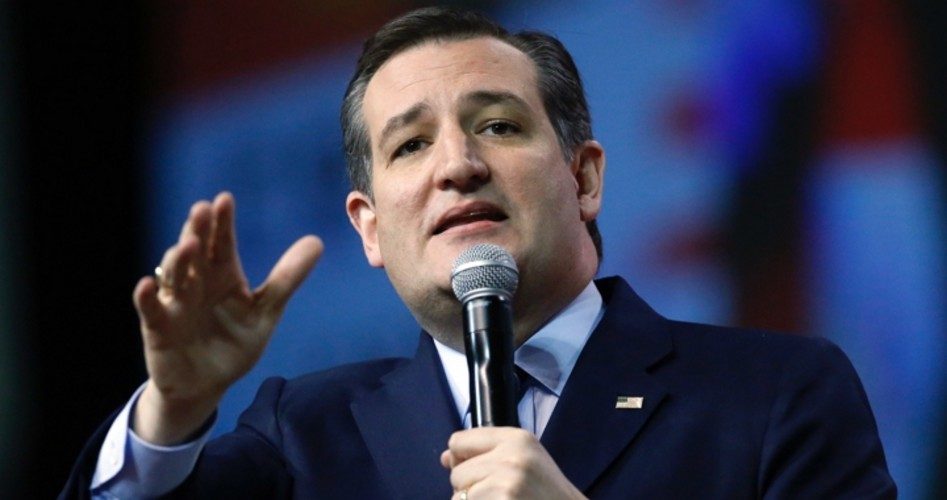
Senator John McCain called Senators Ted Cruz (R-Texas) and Rand Paul (R-Ky.) a couple of “wacko birds” after they conducted a filibuster of CIA Director John Brennan’s drone policy. The left-wing Nation magazine has expressed alarm at the prospect that Cruz might become attorney general. Senator Lindsey Graham, however, who once joked of murdering Cruz on the floor of the Senate, arguing that if the trial was in the Senate “nobody would convict you,” has said he would be fine with Cruz on the Supreme Court. And the man who defeated him for the Republican nomination, and called him “Lyin’ Ted,” President-elect Donald Trump, hosted him at Trump Tower for five hours this week amid speculation that Cruz is Trump’s first choice for attorney general.
Trump and Cruz fought a bitter battle for the Republican nomination, a battle that degenerated into personal insults before it was over. Although Trump invited Cruz to speak at the Republican National Convention, and Cruz did so, the Texas senator did not, at that time, endorse Trump.
But Cruz eventually did announce his support for Trump, specifically citing the importance of Supreme Court nominations, and that Trump had endorsed Cruz’s battle against President Obama’s decision to turn over an important part of the regulation of the Internet to an international body. Since then, the relationship has become much more cordial. Cruz even came to Trump’s defense against the post-election protesters, calling them hypocrites, because they had questioned Trump’s dedication to the process when he refused to say whether he would accept the results of the election, if he lost.
{modulepos inner_text_ad}
“This is hypocrisy on rank display,” Cruz said on Fox and Friends Thursday morning. “The people spoke … And I think Americans across this country … I think Americans are excited about the opportunity to have an administration that actually protects our rights.”
Seventy-one people were arrested in Portland, Oregon, this past weekend when a protest against Trump degenerated into a riot. Similar disturbances are ongoing around the country.
Cruz also challenged media reports that the Trump transition effort was in chaos, calling it “complete silliness.”
“Nobody should be surprised that there are media critics trying to throw rocks at the president-elect and the transition team; they don’t want the president to succeed. What I saw from the president-elect on down to every person at the transition team was men and women working hard with an enormous task in front of them, putting together a new administration of hopefully talented principles, effective leaders — leaders who will be loyal to the president, and loyal to the agenda that he campaigned on and that we promised the American people.”
Cruz added, “I’m eager to work with the new president in any capacity I can.”
Although there has been some reference made to the open seat on the U.S. Supreme Court, most of the speculation of where Cruz could “work” with Trump is as attorney general.
Cruz served as solicitor general of the state of Texas before he was elected to the Senate in 2012, arguing cases before the Texas Supreme Court and before the U.S. Supreme Court. He had also clerked for Chief Justice William Rehnquist before joining the staff of Texas Attorney General Greg Abbott (who is now the governor of Texas).
If anything, the intense opposition on the Left to Cruz should encourage constitutional conservatives. During his presidential campaign, Cruz pledged to revoke all of Obama’s unconstitutional executive orders as the first order of business, but then, “The second thing I intend to do on the first day in office is instruct the U.S. Department of Justice to open an investigation into Planned Parenthood and these horrible videos.”
Cruz’s reference was to the videos produced by the Center for Medical Progress (an effective pro-life group), which seemed to demonstrate that Planned Parenthood officials were making deals to sell the fetal tissue of unborn children for profit. It is speculated that the next Congress might take away all federal funding to the pro-abortion group.
Trump has refused to rule out prosecuting Hillary Clinton. Cruz joked during the Republican campaign that the Democratic debates might eventually have to be held “at Leavenworth,” a federal prison. He added at the time that he hoped Clinton did not make it to the White House, because, “I’ve got slightly different government housing in mind for her.” If Cruz headed up the Department of Justice for Trump as attorney general, he would likely play a critical part in the decision whether to press prosecution against her, or could even play an important role in the appointment of a special prosecutor.
The Nation listed several other things about Cruz that caused them concern. They expressed alarm that Cruz is a “rigid proponent of the death penalty,” and that he had supported the right of the states to execute child rapists. His support of the Ten Commandments outside the Texas State Capitol also concerned them, as well as his “key role” in the U.S. Supreme Court Heller case that “expanded gun rights nationwide.”
In 2008, with the Bush administration going “wobbly” (Cruz’s words) on gun rights, the Texas Solicitor General’s office sided with D.C. resident Dick Anthony Heller, who was challenging the city’s prohibition against handguns. In his book A Time for Truth, Cruz wrote, “Protecting gun ownership isn’t just a matter of good public policy. It is also required as a matter of constitutional law.”
When Bush’s solicitor general, Paul Clement, argued that “reasonable restrictions” are constitutional when they protect “important regulatory interests,” Texas and several other states entered the case on the side of Heller. Cruz was heavily involved in writing an amicus curiae brief for the U.S. Supreme Court. Cruz quoted the Second Amendment, which said that “the right of the people to keep and bear arms shall not be infringed,” adding, “In my view, ‘shall not be infringed’ means exactly that.”
While Cruz would have liked to have seen a stronger pro-gun rights decision by the Supreme Court in the Heller case, he was concerned that four justices “had agreed with the District of Columbia’s radical position … that nobody has any rights whatsoever under the Second Amendment.”
In the case of Medellin v. Texas, Cruz was forced to oppose an attempt by the Bush administration to impose a decision by the International Court of Justice (the World Court) upon the state of Texas. The background to this case goes back to 1993, when two teenage girls were raped and murdered by several members of the “Black and White” street gang. One of the assailants was an illegal alien, José Ernesto Medellin, who wrote a four-page confession, in which he described strangling one of the girls with a belt, and the other with a shoelace.
Medellin was convicted and sentenced to death, but a decade later, the World Court ruled that the United States should reopen the murder conviction of Medellin and 50 other Mexican nationals.
The reasoning of the World Court was that Medellin had not been informed of his right to contact his consulate if arrested in the United States, even though Medellin had lived here almost his entire life. His lawyers had failed to raise the issue at his trial and in his original appeals. The World Court based its ruling on the Vienna Convention, but Congress had not made its stipulations binding on American courts.
In Cruz’s words, “None of this mattered to the World Court. It didn’t respect the prerogatives of Congress. It didn’t respect the rules of Texas’s criminal courts. And it certainly didn’t respect the sovereignty of the United States of America.”
But, then-Secretary of State Condoleezza Rice urged submission to the World Court. And, President Bush even signed a two-paragraph order “purporting to compel the state courts to obey the World Court,” Cruz recalled. U.S. Solicitor General Clement told Cruz that they were taking the position that “the president’s inherent authority as commander-in-chief empowered him to promote ‘international comity’ — goodwill among nations — by forcing the courts of Texas to obey the World Court.”
Cruz and Abbott (the Texas attorney general) argued that no president “can defy the Constitution.” Cruz developed the legal reasoning to argue against Bush’s attempted usurpation of Texas law and American national sovereignty.
Finally, the Supreme Court held, by a vote of 6-3, that the World Court had no authority to bind the U.S. justice system, and the president’s order to Texas was unconstitutional, reasoning that the president cannot unilaterally surrender the national sovereignty of the United States.
Among the most important roles played by the attorney general of the United States is in making recommendations to the president for nominations to the federal judiciary, and Cruz appears to have developed a significant résumé enabling him to make selections to pass on to Trump that would be pleasing to constitutionalists.
The team assembled by a president plays a large role in whether or not that administration will advance an agenda necessary to secure Americans’ liberty and our nation’s national sovereignty. Just how far President-elect Trump will go in this regard may very well be determined over the next several weeks, and Americans who want to see the country’s Constitution restored should pay close attention to his Cabinet selections during that time.
Photo: AP Images


